|
|
|
Sort Order |
|
|
|
Items / Page
|
|
|
|
|
|
|
| Srl | Item |
| 1 |
ID:
121827
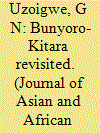

|
|
|
|
|
| Publication |
2013.
|
| Summary/Abstract |
Using primary sources (oral tradition, archival materials, archaeological evidence, 19th century European explorers' and missionaries' accounts) and secondary sources (historical, anthropological, archaeological, etc.), this article reevaluates, in a historical perspective, the decline and diminishment in political power and scale as well as in population and landmass of Bunyoro-Kitara, the earliest kingdom in East Africa's lake region. It concludes that, contrary to the conventional wisdom proffered by 19th century Europeans and sanctified by Makerere University scholarship, the kingdom declined essentially because of the extraordinary errors of judgment and incompetence of most of its rulers from the close of the 17th century to the close of the 19th century, devastating deceases (human and animal), and brutal British conquest resulting in the death of thousands of individuals and loss of territory. By 1900 the kingdom's population had declined by about four-fifths and landmass by about two-thirds. No major African kingdom experienced such an enormous outcome. Herein lies the fascination with this subject.
|
|
|
|
|
|
|
|
|
|
|
|
|
|
|
|
| 2 |
ID:
121833
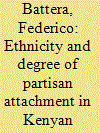

|
|
|
|
|
| Publication |
2013.
|
| Summary/Abstract |
The present analysis disaggregates election results and voter turnout according to the voters' ethnic background during a time span which covers three electoral processes (1997-2007) in Kenya. The two data combined produced an index which was called the 'degree of mobilization index'. Given that most of the Kenyan parties proved to be ethnic or made of ethnic alliances, voter turnout was found crucial in differentiating the degree of ethnic mobilization. Ethnicity alone, however, failed to explain these differences. The findings were likely linked to the past record of patronage for the five selected ethnic groups and the ability of such groups to provide a cohesive ethnic leadership.
|
|
|
|
|
|
|
|
|
|
|
|
|
|
|
|
| 3 |
ID:
121829
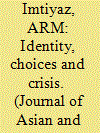

|
|
|
|
|
| Publication |
2013.
|
| Summary/Abstract |
This study attempts to understand the choices made by Muslim political leaders in general, and after independence in particular. Muslim leadership has been broadly classified into two categories based on their respective agendas. This paper looks critically at the choices made by Muslim leaders, as well as some state concessions that could have contributed to growing Islamic fundamentalism. It finally suggests some measures to the current problems of (North and East) Muslims: socio-economic concessions and local power-sharing.
|
|
|
|
|
|
|
|
|
|
|
|
|
|
|
|
| 4 |
ID:
121830
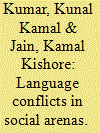

|
|
|
|
|
| Publication |
2013.
|
| Summary/Abstract |
This paper argues that our understanding of the issues related to language conflicts inside business organizations would be enriched by close analysis of the conflicts that take place in the larger arena of the social sphere, of which the business organizations are a part. Taking clues from earlier studies, the paper argues that the prime reason behind linguistic conflicts is the fear of loss of linguistic identity by the linguistic minorities. It is further debated that the same factors related to the loss of linguistic identity would play a role in the business arena as well where the official language of the workplace puts its native speakers in an undue advantageous position with respect to other members who have learnt the official language as their second language.
|
|
|
|
|
|
|
|
|
|
|
|
|
|
|
|
| 5 |
ID:
121832
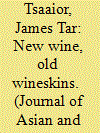

|
|
|
|
|
| Publication |
2013.
|
| Summary/Abstract |
Much of Nigerian oral poetry, especially the musical genre, has been increasingly reduced to digital formats through the instrumentality of new media technologies. This transformation has, however, not been sufficiently acknowledged in oral literary researches and discourses. This alternative existence acquired by the oral forms manifests itself in digital technological modes like CDs, VCDs, DVDs, digital radio and television and the internet which assure them of longevity. This paper, therefore, engages Nigerian oral poetry and its inscription in digital processes using new media technologies. In particular, it negotiates the trajectory of transforming primary orality to secondary and tertiary orality through which oral performances like songs have acquired new modes of existence and meanings by way of recordings and digitalization using the new media. Many of these poetic forms have travelled through historical time to the postmodern moment as migrant metaphors and have become stored in digital forms thus making them new wine though preserved in the old wineskins of the poets and new media processes. Using an emergent generation of Nigerian popular poets and musical artistes, the paper problematizes the episteme of authorship. It interrogates the very idea of authorship in the contested and interstitial space of communal and individual authorship in the digital age where the term has undergone radical destabilisation. Who owns the oral forms, for instance? Is it the so-called anonymous composer in traditional society, the collector or recorder who mediates the creative process and becomes a surrogate agent, or the contemporary artist who is heir to this timeless tradition of oral intellection through performances that are digitalized and stored in retrieval systems, or is it a virtual community of authors, or a hybrid of all of these? The paper concludes that digital technologies are a means of preserving these oral forms and endowing them with vitality and enduring relevance to meet the immediacy and urgency of postmodern societal needs in Nigeria.
|
|
|
|
|
|
|
|
|
|
|
|
|
|
|
|
| 6 |
ID:
121831
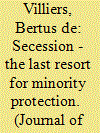

|
|
|
|
|
| Publication |
2013.
|
| Summary/Abstract |
'Secession' is a word that brings fear to nations. It reeks of conflict, violence and instability. It is also a measure of last resort. It sometimes brings hope to minorities that are in despair and who feel permanently excluded from policy making. This article looks at some of the faces of secession. It investigates how international law is vague on the one hand and pragmatic on the other hand when it comes to secession. It shows how, in recent times, secession has been endorsed by the international community in cases such as East Timor, Eritrea and Kosovo while in Ethiopia and Canada legal mechanisms exist for managing demands for secession. Consideration is given to some of the pre-requisites for secession. Finally general observations are made about secession as a mechanism to protect minorities.
|
|
|
|
|
|
|
|
|
|
|
|
|
|
|
|
| 7 |
ID:
121826
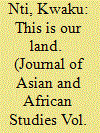

|
|
|
|
|
| Publication |
2013.
|
| Summary/Abstract |
The colonial government attempted to implement the Crown Lands Bill between 1894 and 1897 in Southern Ghana. Among other things, it sought to take control of what was described as 'waste lands' and later 'public lands.' This article focuses on resistance to these bills in which the Aborigines' Rights Protect Society (ARPS) played a leading role on behalf of Southern Ghana. This was one of many precedents to the build-up of tension between the people and the colonial establishment. Among other things, the article examines the ramblings within a colonial administration that attempted to push through its policies against a background of resolute resistance. This led to reluctance on the part of some colonial officers to enforce the policy. The argument is that there was an effective collaboration between the Western-educated elite and the people of coastal Southern Gold Coast in the resistance to these bills. They used official letters of protests, newspaper articles, editorials, and demonstrations to express their dislike for the colonial land policy. In addition, they sent delegations to the colonial government in their effort to resist the attempt to take over 'waste lands' and later 'public lands.' Furthermore, this article argues that the conflict had to do with the different conceptions of land. While the colonial government saw it as part of the economic and political trappings of power, the people of Southern Ghana saw land as a cultural and religious resource that gave them the needed connection with the ancestors in their everyday life.
|
|
|
|
|
|
|
|
|
|
|
|
|
|
|
|
| 8 |
ID:
121828
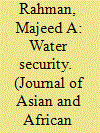

|
|
|
|
|
| Publication |
2013.
|
| Summary/Abstract |
This article examines the transboundary water challenges among riparian states in and around the Nile river basin. The article argues in agreement with the Collier-Hoeffler conflict model (1998) which claims that Africa's natural endowments, such as diamonds, gold, copper, bauxite, and oil, are strong predictors of violent conflict in Africa. This article further posits that these natural economic endowments, such as natural resources and geographical locations which include the Nile river basin, are potential triggers of conflict in the horn of Africa.
|
|
|
|
|
|
|
|
|
|
|
|
|
|
|
|
|
|
|
|
|